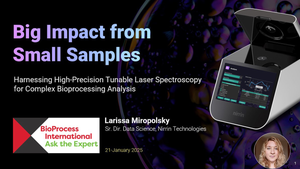
Expansion Special: J&J, Ascend, and Aspen ramp up global biomanufacturing capacityExpansion Special: J&J, Ascend, and Aspen ramp up global biomanufacturing capacity
Ascend, Aspen, and J&J scale up facilities in the US and Europe, advancing the production of biologics, AAVs, and cell therapies for critical conditions. Welcome to BioProcess Insider’s expansion roundup.
.jpg?width=1280&auto=webp&quality=95&format=jpg&disable=upscale)
Johnson & Johnson has invested $2 billion in a manufacturing facility in Wilson, North Carolina. The biologics facility is expected to open in early 2025 and will introduce approximately 420 jobs in the area.
As the biopharma bigwig plans to advance 70 novel therapies by the end of the decade, this facility will expand production of biologic medicines in areas including oncology, immunology, and neuroscience.
“A strong, global supply chain is crucial, and we purposefully invest to ensure our transformational medicines reliably and efficiently reach patients around the world,” said Dapo Ajayi, vice president, innovative medicine supply chain, Johnson & Johnson.
“We are investing in capacity and new technologies to enhance our industry leading capabilities and ensure a resilient supply chain for the future. North Carolina is an important hub for biopharmaceutical manufacturing and talent, and we are pleased to join this thriving life-sciences ecosystem and become part of the Wilson community.”
Ascend Advanced Therapies
Adeno-associated virus (AAV) developer, Ascend is expanding fill/finish capacity at its manufacturing facility in Alachua, Florida, and bolstering its quality control (QC) testing at its Munich, Germany facility.
Ascend acquired the Alachua facility from ophthalmic gene-therapy company Beacon Therapeutics in April 2024. According to the firm, the facility will add manufacturing suites and bioreactors with capacity up to 500 L, along with a temperature controlled GMP warehouse and process development labs with operational space.
Meanwhile, the Munich site, which has been previously described by the firm as “a hub of biotech activity in continental Europe,” will amp its GMP QC testing, analytical capabilities, and process development capacity to meet industry demand.
“There are both tangible and intangible assets that make a company want to work with a contract manufacturer,” said Mike Stella, CEO at Ascend. “Our goal is to align these assets and deliver clients an exceptional experience, regardless of whether it is development projects or full clinical drug production.”
“As our footprint grows, we will iterate over two decades of therapeutic AAV expertise into a connected global footprint with cutting-edge, enabling technologies, and analytics for our clients.”
The financials associated with the expansions were not disclosed. However, Ascend aims to hit the ground running at both the Alachua and Munich facilities by the end of 2025.
Aspen Neuroscience
Autologous cell-therapy developer Aspen Neuroscience is expanding it San Diego, California facility near its headquarters in Torrey Pines. Adding 22,000 square-foot, the facility will manufacture induced pluripotent stem cell (iPSC)-derived cell therapies focusing on Aspen's ANPD001 drug product.
The facility will house three 14,000 square-foot manufacturing suites along with a 3,000 square-foot manufacturing space. It will also comprise QC laboratories, a warehouse, and offices. Moreover, an additional 8,000 square-foot space is available for future expansion.
“We are proud to have expanded in San Diego, given that ANPD001 was originally developed here. This new site will help accelerate the manufacture of patient-specific cell lines for our ASPIRO trial patients in California and across the US,” said Damien McDevitt, CEO of Aspen Neuroscience. "We continue to advance the entire cell-therapy field with this new treatment modality."
ANPD001 is an iPSC-derived cell therapy for Parkinson's Disease (PD) and has been given investigational new drug (IND) clearance from the US Food and Drug Administration (FDA) in August 2023. The personalized, autologous cell therapy is under investigation and replaces lost dopamine neurons to treat Parkinson’s disease. It was granted a fast-track designation by the FDA in October 2023.
About the Author
You May Also Like







